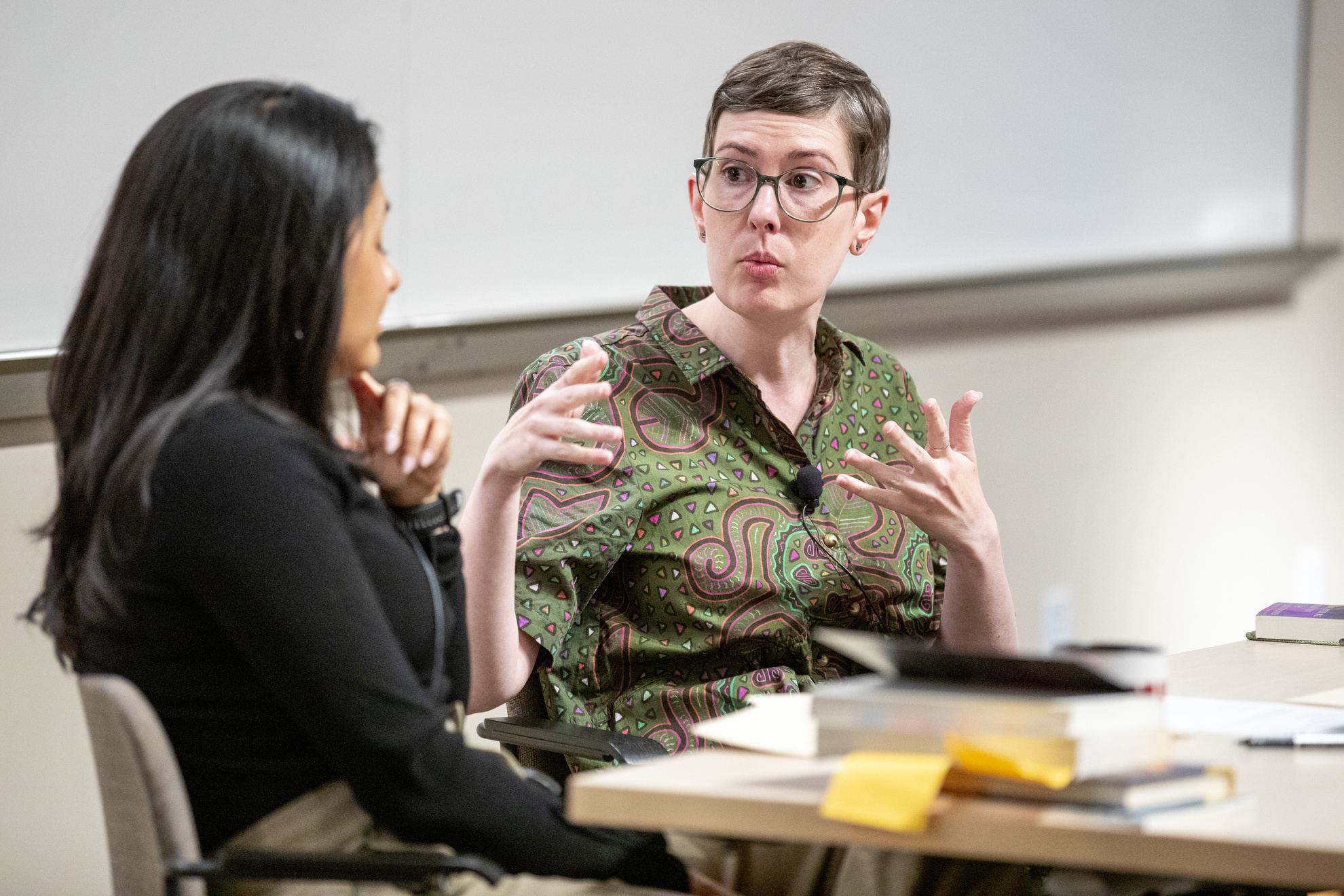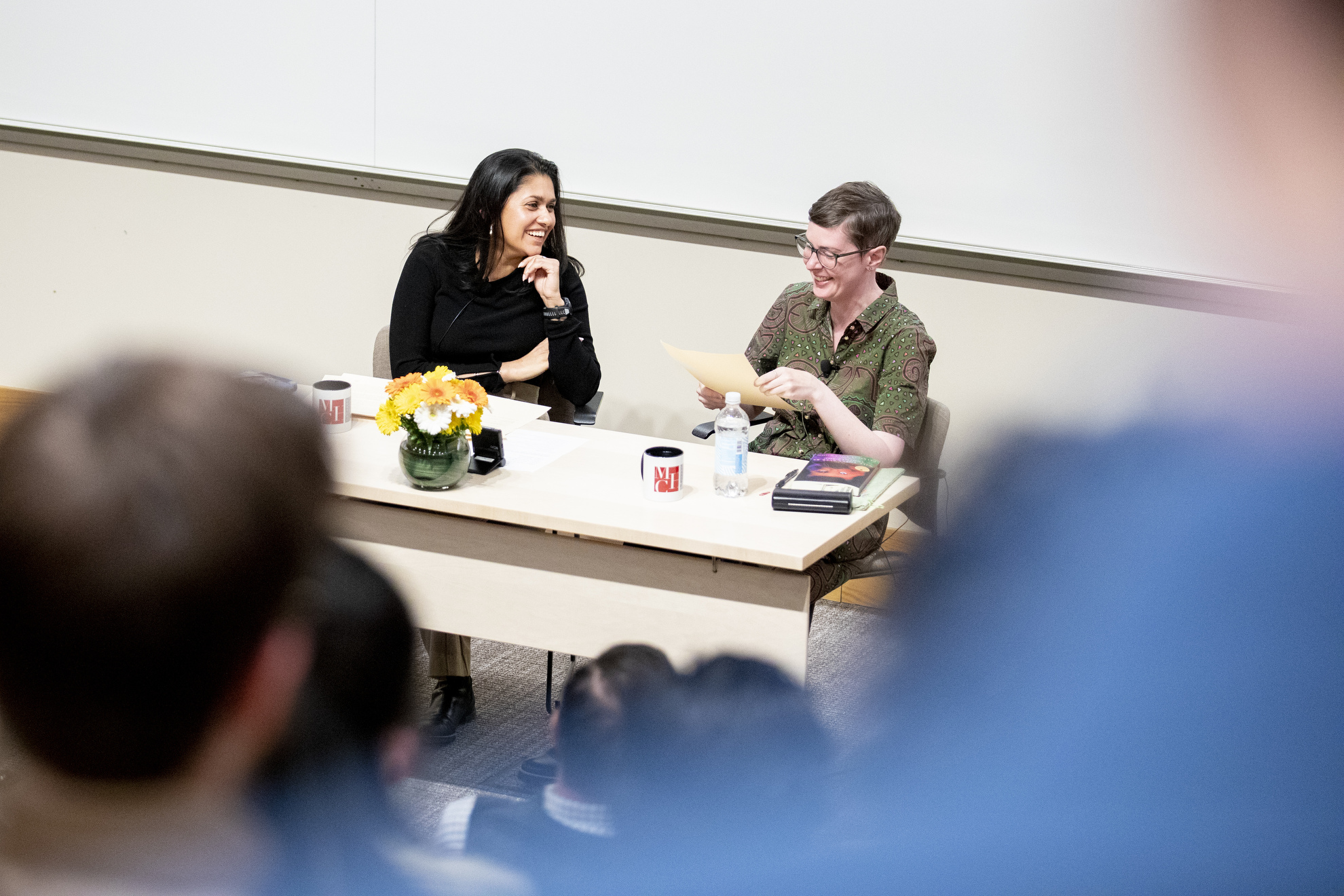
Photos by Veasey Conway/Harvard Staff Photographer
Patricia Lockwood wants you to admit the internet is real life
In Harvard talk, author riffs on ‘cloistered’ upbringing, crafting characters through dialogue, working in bed vs. on couch
Patricia Lockwood thinks people are uncomfortable with the idea that the internet is real life. It’s why she believes novels about the internet — including her 2021 book, “No One Is Talking About This,” about a social media star whose online life gets upended by a family emergency — are often dismissed as frivolous.
“Honestly, it made people malfunction, like they didn’t know what to do,” Lockwood said about her debut novel at a recent Writers Speak event hosted by the Mahindra Humanities Center. “There was still this idea that the internet couldn’t be in a book, and that really fascinated me.”
The discomfort, she theorized, stems from people perceiving their own online lives as private and embarrassing. To admit that the internet is real life is to admit a person’s online self is their authentic self, Lockwood told the Fong Auditorium audience.
The poet, novelist, and author of the 2017 memoir “Priestdaddy,” who is known for her sharp literary voice and irreverent social media presence, spoke with FAS Assistant Professor of English Tara K. Menon about crafting characters, writing long-form in an era of micro-content, and the art of inhabiting another writer’s mind.
“I think it’s worthwhile to spend your life reading and writing, and I think it’s worthwhile studying the way other people did those things,” said Lockwood, adding that, given a free day, she would probably spend eight hours of it reading.

Lockwood’s characters are vivid and complex on the page and in real life — none more so than her father, a gun-loving Navy veteran who became a Catholic priest despite being married with five children. Whether writing about him, or fictional characters, she said capturing their dialogue was key.
“If I can reproduce the speech patterns of my parents, if I can write down those odd turns of phrase, you have them,” Lockwood said. “You don’t necessarily need their interiority — because I don’t have that, I don’t understand why they do anything — but I know how they sound, and I know how they interact with each other, and I know how they interact with me.”
Lockwood said her extremely “cloistered” upbringing in the rectory where her family lived after her father became a priest helped her to keenly observe the world.
“I didn’t get out into the world the way that people did, so my encounters with it felt rare or cherished,” she said. “Walking around Harvard Square becomes a very, very rare experience, and you notice all aspects of it. If you notice all aspects, you set them down. That’s how it works for me.”
“I do it [literary criticism] because it is some sort of celestial homework. I do feel like you are working through someone’s mind.”
Lockwood, who didn’t go to college, said that exploring literature on her own gave her a sense of freedom that has helped rather than hindered her as a writer. She could choose her own translations of Tolstoy and not read any ancillary material and biographies if they weren’t interesting to her.
“I didn’t have anxiety about interpretation, really,” Lockwood said. “I was experiencing them as production of a mind, and I was trying to project myself into that mind, into that capability, from a very young age.”
Her preference is to write propped up in bed, notebook on her knees and a cat by her side, but chronic migraines have forced her to adopt a more ergonomic setup. These days, Lockwood writes perched at the end of one couch, legs stretched onto another. She demonstrated her signature posture on a sofa that was hastily dragged onstage, to the delight of the audience.
Menon so admires Lockwood’s literary criticism, especially her searing review of John Updike in the London Review of Books, that she compiled a list of what makes Lockwood such a good critic.
“One thing that I feel has become more and more rare is that you’re not afraid to do two things: say something is good or bad or a failure, and say whether you liked it or didn’t like it,” Menon said. “Even more impressive if you didn’t.”
“I do it because it is some sort of celestial homework,” Lockwood said. “I do feel like you are working through someone’s mind. You’re entering those times, how they thought, and you’re entering their talent. If you feel your own talent to be limited, it’s like you take on their abilities for a time. It’s really this transmutation. It’s amazing. You go above your own height.”
During the Q&A session, an audience member asked Lockwood if the form of the novel can survive in an era of micro-content and shrinking attention spans. Lockwood answered that some people welcome long-form fiction even when surrounded by micro-content. She cautioned against trying to find a prescription for shrinking attention spans or adopting new literary forms to follow a perceived trend.
“I don’t think that because we write this way online, that this is the appetite,” Lockwood said. “I think that the novel creates appetites. If you like the ‘fat,’ stick with the fat, you don’t have to sear that away. People who need solace, people who need to flee from that fragmentation, go to people like you for that sort of thing.”




